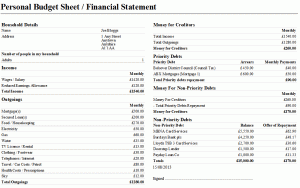
“Second Charge Lenders Still Have a Good Appetite” – David Beard of Lending Expert
A founder of one of the UK’s leading price comparison …
Debt relief, debt consolidation or debt management companies take your existing debt and work with you to provide a structured way for you to pay them off.
This service is not aimed at a consumer that has one or two outstanding credit card debts or loans but is really more appropriate for those who have:

Over 9 million people in the UK are in serious debt which makes up more than 10% of the UK’s population. A spiral of debt can start when you have a tough month, or when big expenses come out of the blue such as medical emergencies or home repairs.
This can result in you borrowing another loan or credit card to pay that off which then results in higher interest rates and late fees accumulating faster than you can pay them off, or above your income.
Debt causes lots of stress – especially the hidden burden of knowing that you currently owe money to people that you cannot pay off and that your house, car or other property might be repossessed at any moment. This combined with the constant pursuit of calls, texts, letters and email, or even the bailiffs at the door. It can feel like a tough spot to get out of.
Sometimes you approach the debt management company, and sometimes they approach you. You might find that you are denied when you apply for a credit card or loan (this could be due to a bad credit score) and at this point you might be recommended to a debt management company that can help.
To begin, they will take all of your outstanding debts and create a plan to consolidate your debt. This works by putting all of your debt into one loan that you will pay off in to one account each month. This saves the stress and hassle of approaching every lender individually and having to pay them directly every month or week.
The debt company will negotiate on your behalf and work out a pay plan as well as freezing the interest that keep mounting up. This means that instead of having to pay the outstanding amount like £150 or £300, you can pay back £5 every week or month and over a period of time you can clear your debt.
Your only goal is to make sure you have an income every week that can pay off the debt consolidation loan. Most of your income will be put towards paying off arrears and you will apportion the rest for entertainment, rent, food and other necessities like clothing and a TV license.
The debt management company will add a bit extra to your monthly payment, which will be their fee for managing your debt – unless you use a charity who will not charge you any debt.

In the above example you can clearly see essential expenditure and income on the left, and monthly offers and arrears on the right.
Debt management loans are always unsecured meaning you should not have to put any collateral such as your car or house. This means that if you can’t keep up with the plan you will not risk losing your home.
Working with debt management companies are not the only solutions to clearing huge amounts of debt.
You can actually create your own debt consolidation loan by organising all existing debts, creating a pay plan with every single debtor, and then making sure to put money aside for essentials. Excel is great or this.
There are charities and debt advice services including CitizensAdviceService and MoneyAdviceService for free impartial advice on getting out of debt. Options include working with professionals who help you get out of your tight situation. They also provide course and training on how to manage your debt.
If you find yourself in a better financial position by getting a raise from work or a large inheritance, you could seek to pay off your debts sooner.
Be sure to read through all the terms and conditions carefully. The promise of being debt free and putting a stop to calls, letters and emails from your debtors is incredibly appealing but you have to read the fine print.
Make sure you understand the fees you are being charged and be aware of how much your monthly expenses will be. You need to ensure all of your essentials are included otherwise you will not be able to keep up with the debt consolidation plan.
Do not be tempted to use the first company that approaches you. Make sure that the company you work with is FCA approved.

A founder of one of the UK’s leading price comparison …

What Are Personal Loans Used for? Consolidating existing debt Make …

How Do Bad Credit Loans Work? Loans for bad credit …